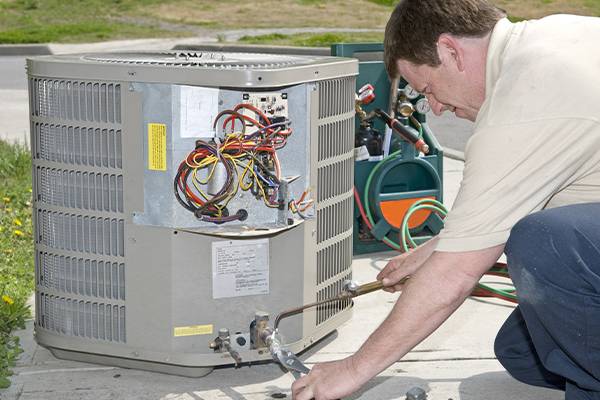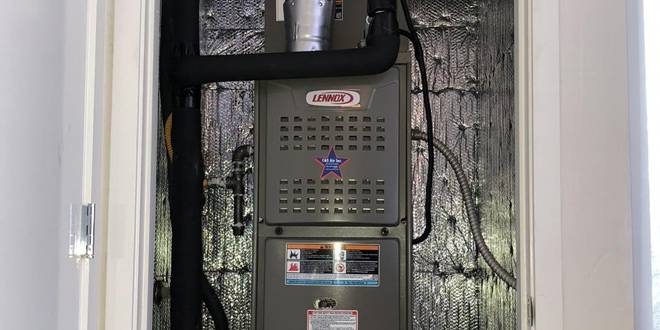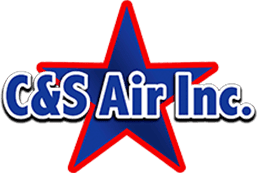
| Feature | Heat Pumps | Furnaces |
| Efficiency | Up to 300% (transfers heat rather than generates it) | Up to 98% (varies by fuel type and model) |
| Installation Costs | $3,000 – $8,000 (higher due to dual functionality) | $2,500 – $6,000 (lower initial cost) |
| Operating Costs | Lower due to high efficiency in moderate climates | Depends on fuel type (natural gas usually lower) |
| Environmental Impact | Lower (fewer greenhouse gas emissions) | Higher (combustion of fossil fuels) |
| Lifespan | 10-15 years | 15-20 years |
| Maintenance Costs | $150 – $300 annually (regular maintenance required) | $100 – $300 annually (regular maintenance required) |
| Best Climates | Moderate climates, mild winters | Cold climates, harsh winters |
| Heating Capability | Effective in moderate climates, provides cooling too | Strong and reliable in cold climates |
| Versatility | Heating and cooling in one system | Primarily for heating, separate AC needed for cooling |
| Recommended For | Smaller to medium-sized, well-insulated homes | Larger homes, less insulated, cold regions |
Choosing the right heating system for your home is essential to ensure comfort and energy efficiency throughout the colder months. Two of the most popular options are heat pumps and furnaces. Each has its unique advantages and considerations, making the decision a bit challenging for homeowners.
In this guide, we will explore the differences between heat pumps and furnaces, helping you determine which option is best suited for your needs. Whether you’re considering upgrading your current system or installing a new one, understanding how these heating solutions work and their benefits will help you make an informed decision.
C&S Air is dedicated to providing high-quality HVAC solutions for both residential and commercial customers in Mansfield, TX. If you’re looking for expert advice or professional HVAC services, visit our residential services page or check out our commercial HVAC services.
How Heat Pumps Work
Heat pumps are an energy-efficient alternative to traditional heating systems. They operate by transferring heat from one place to another rather than generating heat directly. This process makes them highly efficient and versatile for both heating and cooling.
Operation of Heat Pumps
Heat pumps work on the principle of heat transfer. During the winter, they extract heat from the outside air, ground, or water and transfer it indoors. Conversely, during the summer, they reverse the process, removing heat from your home and releasing it outside, effectively acting as an air conditioner.
Benefits of Heat Pumps
- Energy Efficiency: Heat pumps are known for their high energy efficiency. Because they move heat rather than generate it, they can provide up to three times more heat energy to a home than the electrical energy they consume.
- Versatility: A major advantage of heat pumps is their ability to serve both heating and cooling needs, making them an all-in-one solution for year-round comfort.
- Environmental Impact: Heat pumps produce fewer greenhouse gas emissions compared to traditional furnaces, especially when powered by renewable energy sources.
- Cost Savings: Over time, the efficiency of heat pumps can lead to significant savings on energy bills.
Considering these benefits, heat pumps can be an excellent choice for many homeowners. If you’re interested in learning more about how heat pumps can work for your home, check out our air conditioning services and AC installation options.

How Furnaces Work
Furnaces are one of the most common heating systems used in homes across the United States. They operate by generating heat through the combustion of natural gas, oil, or electricity and distributing this heat throughout the home via ductwork.
Operation of Furnaces
Furnaces work by igniting a fuel source, which heats up a metal heat exchanger. Air from your home’s ductwork blows over the heat exchanger, warming the air before it is distributed through the ducts to heat the home. This process provides a robust and reliable source of heat, especially in colder climates.
Benefits of Furnaces
- Strong Heating Capability: Furnaces can produce a significant amount of heat, making them ideal for areas with extremely cold winters.
- Reliability: Modern furnaces are designed to be highly reliable and can last for many years with proper maintenance.
- Quick Heat Distribution: Furnaces can quickly heat a home, providing immediate comfort when the temperature drops.
- Cost-Effective Fuel Options: Natural gas furnaces, in particular, can be very cost-effective due to the relatively low price of natural gas.
Furnaces are a dependable choice for many homeowners, particularly in regions where temperatures frequently dip below freezing. To explore more about furnace options and related services, visit our pages on AC repair, AC maintenance, and AC parts replacement.

Comparing Heat Pumps and Furnaces
When deciding between a heat pump and a furnace, several factors come into play. Here, we’ll compare the two based on efficiency, installation costs, operating costs, environmental impact, lifespan, and maintenance.
Efficiency
- Heat Pumps: Highly efficient as they transfer heat rather than generate it. They can achieve efficiency rates of 300% or more, meaning they provide three units of heat for every unit of electricity consumed.
- Furnaces: Efficiency varies depending on the type. Modern gas furnaces can achieve efficiency rates of up to 98%, while older models may be significantly less efficient.
Installation Costs
- Heat Pumps: Typically more expensive to install due to their dual heating and cooling capabilities. Installation complexity can also increase costs, especially for geothermal heat pumps.
- Furnaces: Generally less expensive to install than heat pumps. The cost can vary depending on the type of furnace and the existing ductwork in the home.
Operating Costs
- Heat Pumps: Lower operating costs due to their high efficiency, particularly in moderate climates. However, their efficiency can decrease in extremely cold temperatures, potentially increasing costs.
- Furnaces: Operating costs depend on the fuel type. Natural gas furnaces usually have lower operating costs than electric furnaces but may be higher than heat pumps in milder climates.
Environmental Impact
- Heat Pumps: Environmentally friendly, especially when powered by renewable energy sources. They produce fewer greenhouse gas emissions compared to combustion-based systems.
- Furnaces: Higher environmental impact due to the combustion of fossil fuels. However, high-efficiency gas furnaces are less impactful than older, less efficient models.
Lifespan and Maintenance
- Heat Pumps: Typically have a lifespan of 10-15 years. Require regular maintenance to ensure efficiency and longevity, particularly for components like the compressor and refrigerant lines.
- Furnaces: Can last 15-20 years or more with proper maintenance. Regular inspections and maintenance of the burner, heat exchanger, and blower are essential for safe and efficient operation.
Considering these factors, the best choice depends on your specific needs and circumstances. For personalized advice on heating solutions, contact C&S Air for a consultation.
Climate Considerations
The effectiveness and efficiency of heat pumps and furnaces can vary greatly depending on the climate in which they are used. Here, we’ll discuss the best climates for each type of heating system.
Best Climates for Heat Pumps
Heat pumps are particularly well-suited for moderate climates where temperatures rarely drop below freezing. They excel in regions with mild winters and can provide efficient heating and cooling throughout the year.
- Moderate Climates: In areas like the Southern United States, heat pumps can maintain high efficiency, providing comfortable heating without the high energy costs associated with extreme cold.
- Coastal Areas: Coastal regions, which typically experience mild temperatures, are ideal for heat pumps. The consistent climate allows heat pumps to operate efficiently year-round.
Best Climates for Furnaces
Furnaces are ideal for colder climates where temperatures frequently drop below freezing. They can provide consistent and robust heating, making them a reliable choice for homes in these regions.
- Cold Climates: In areas with harsh winters, such as the Northern United States and Canada, furnaces can deliver the necessary heat to keep homes warm and comfortable even during the coldest months.
- Mountainous Regions: Regions at higher elevations that experience significant snowfall and cold temperatures benefit greatly from the powerful heating capabilities of furnaces.
Understanding the climate-specific advantages of heat pumps and furnaces can help you make an informed decision. If you live in an area with varying temperatures and need expert advice, C&S Air can provide personalized recommendations for your heating needs.

Cost Analysis
When choosing between a heat pump and a furnace, it’s crucial to consider the overall costs involved. This section will break down the upfront costs, long-term savings, and maintenance costs associated with each system.
Upfront Costs
- Heat Pumps: The initial cost of a heat pump can be higher than that of a furnace. The price varies based on the type (air-source, ground-source, or water-source) and the complexity of installation. On average, homeowners can expect to pay between $3,000 and $8,000 for a heat pump system.
- Furnaces: Furnaces generally have lower upfront costs compared to heat pumps. The cost depends on the fuel type (natural gas, oil, or electric) and the efficiency rating. Typically, a new furnace can cost between $2,500 and $6,000.
Long-Term Savings
- Heat Pumps: Due to their high efficiency, heat pumps can lead to substantial long-term savings on energy bills. The ability to provide both heating and cooling in one system further contributes to savings.
- Furnaces: While furnaces may have higher operational costs, particularly if running on electricity, high-efficiency gas furnaces can still offer reasonable energy savings. However, these savings might not be as significant as those offered by heat pumps.
Maintenance Costs
- Heat Pumps: Regular maintenance is essential to keep heat pumps running efficiently. This includes checking refrigerant levels, cleaning coils, and ensuring the system is free of leaks. Annual maintenance costs typically range from $150 to $300.
- Furnaces: Furnaces also require regular maintenance to ensure safe and efficient operation. This involves inspecting and cleaning burners, checking the heat exchanger, and ensuring proper ventilation. Annual maintenance costs for furnaces are similar, usually between $100 and $300.
By analyzing these costs, you can better understand the financial implications of each system. For a detailed cost assessment and personalized recommendations, contact C&S Air for expert advice.
Which is Right for You?
Deciding between a heat pump and a furnace depends on several factors, including your home’s size, insulation quality, personal preferences, and climate. Here’s a guide to help you determine which heating solution might be best for you.
Factors to Consider
- Home Size and Layout:
- Heat Pumps: Best for homes with open floor plans and moderate heating and cooling needs. Ideal for small to medium-sized homes.
- Furnaces: Suitable for larger homes with extensive ductwork. They can efficiently heat multiple rooms and larger spaces.
- Insulation Quality:
- Heat Pumps: Work best in well-insulated homes that retain heat effectively. Good insulation helps maintain efficiency and comfort.
- Furnaces: Can provide powerful heating even in less insulated homes, making them suitable for older homes with draftier structures.
- Personal Preferences:
- Heat Pumps: Great for those seeking an all-in-one solution for heating and cooling. If you prefer a more environmentally friendly option, a heat pump is ideal.
- Furnaces: Ideal for those who prioritize strong, consistent heating during harsh winters. If you prefer a traditional heating method, a furnace might be the better choice.
- Climate:
- Heat Pumps: Best for regions with mild to moderate winters where temperatures rarely fall below freezing.
- Furnaces: Better suited for areas with extremely cold winters, as they provide reliable and powerful heating.
Recommendations Based on Different Scenarios
- Scenario 1: Mild Winters and Year-Round Comfort: If you live in a region with mild winters and want efficient year-round heating and cooling, a heat pump is an excellent choice. For personalized guidance, explore our air conditioning services.
- Scenario 2: Cold Winters and Large Home: If your home is large and located in a region with very cold winters, a furnace will ensure your home stays warm and comfortable. For expert advice on furnace installation and maintenance, contact C&S Air.
Making the right choice for your heating needs ensures comfort and efficiency. For further assistance in choosing the best system for your home, reach out to C&S Air.

Conclusion
Choosing the right heating system is crucial for ensuring your home’s comfort and energy efficiency. Both heat pumps and furnaces have their unique advantages, and the best choice depends on various factors such as climate, home size, insulation, and personal preferences.
Recap of Key Points
- Heat Pumps: Offer high energy efficiency, versatility for both heating and cooling, and are environmentally friendly. Ideal for moderate climates and well-insulated homes.
- Furnaces: Provide strong, reliable heating, especially in colder climates. They are suitable for larger homes and those with less insulation.
By understanding the differences between these systems, you can make an informed decision that meets your specific needs. For personalized advice and professional HVAC services, C&S Air is here to help.
Contact Us Today!
Ready to choose the best heating solution for your home? Contact C&S Air today to schedule a consultation. Our experts will help you assess your heating needs and provide tailored recommendations.
Whether you need air conditioning services, AC repair, AC installation, AC maintenance, or AC parts replacement, we have you covered. For commercial needs, explore our commercial HVAC services and commercial AC repair.
